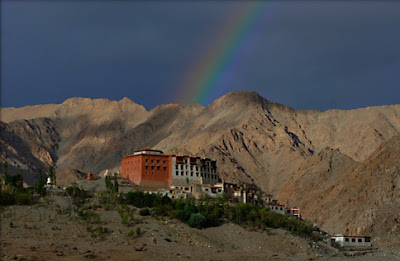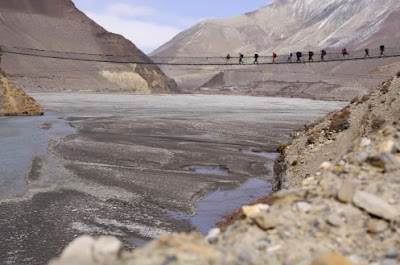 "And when the body grows weak through old age, or becomes weak through illness, at that time that person, after separating himself from his members, as a mango, or fig, or Pippala-fruit is separated from the stalk, hastens back again as he came, to the place from which he started, to new life. . .
"And when the body grows weak through old age, or becomes weak through illness, at that time that person, after separating himself from his members, as a mango, or fig, or Pippala-fruit is separated from the stalk, hastens back again as he came, to the place from which he started, to new life. . .
"Then both his knowledge and his work take hold of him and his acquaintance with former things.
"And as a caterpillar, after having reached the end of a blade of grass, and after having made another approach to another blade, draws itself together towards it, thus does this Self, after having thrown off this body and dispelled all ignorance, and after making another approach to another body, draw himself together towards it.
"And as a goldsmith, taking a piece of gold, turns it into another, newer and more beautiful shape, so does this Self, after having thrown off this body and dispelled all ignorance, make unto himself another, newer and more beautiful shape. . .
"Now as a man is like this or like that, according as he acts and according as he behaves, so will he be: a man of good acts will become good, a man of bad acts, bad. He becomes pure by pure deeds, bad by bad deeds.
"And here they say that a person consists of desires. And as is his desire, so is his will; and as is his will, so is his deed; and whatever deed he does, that he will reap.
"And here there is this verse: 'To whatever object a man's own mind is attached, to that he goes strenuously together with his deed; and having obtained the consequences of whatever deed he does here on earth, he returns again from that world . . . to this world of action.'[1]
"So much for the man who desires. But as to the man who does not desire, who, not desiring, freed from desires, is satisfied in his desires, or desires the Self only, his vital spirits do not depart elsewhere--being Brahman, he goes to Brahman.
"On this there is this verse: 'When all desires which once entered his heart are undone, then does the mortal become immortal, then he obtains Brahman.'"
* * *
"Now as a man, when embraced by a beloved wife, knows nothing that is without, nothing that is within, thus this person, when embraced by the intelligent Self, knows nothing that is without, nothing that is within. This indeed is his true form, in which his wishes are fulfilled, in which the Self only is his wish, in which no wish is left--free from any sorrow.
"Then a father is not a father, a mother not a mother, the worlds not worlds, the gods not gods, the Vedas not Vedas. Then a thief is not a thief, a murderer not a murderer, a Kandala not a Kandala, [2] a Sramana not a Sramana, [3] a Tapasa not a Tapasa.[4] He is not followed by good, not followed by evil, for he has then overcome all the sorrows of the heart."[1] This is the law of karma.
[2] The kandalas were the lowest of all the pariahs, those without caste.
[3] A holy beggar.
[4] A person atoning for sins.
The Brihadaranyaka Upanishad, from the translation by Max Mueller, The Upanishads, in Max Mueller, ed., The Sacred Books of the East, 50 vols. (Oxford; Clarendon Press, 1879-1910), vol. 1, pp. 92, 104-105 and vol. 15, pp. 173, 175-177, 168-169 passim. Introduction and e-text copyright 2005 by David W. Koeller timemaster@thenagain.info. All rights reserved.
Photo ©Zeynep Kanra; to see more photos by Zeynep Kanra please refer to:
http://www.zeynepinyeri.com/http://www.flickr.com/photos/zeynepk/















.jpg)


































